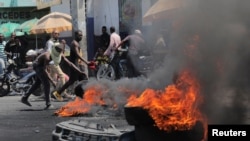The United Nations and various humanitarian agencies called on Thursday for the immediate opening of a humanitarian corridor in Haiti to allow access to fuel at the country’s main fuel terminal.
“What we need is to unlock the fuel terminal so we can get fuel to pump clean water, to reopen hospitals, to allow families to have access to clean water,” said Ulrika Richardson, UN resident and humanitarian coordinator for Haiti. .
The Varreux terminal, which is the main entry point for fuel into Haiti, has been blockaded by armed gangs since mid-September, leading to widespread fuel shortages.
“This is killing people, literally killing people,” Richardson told reporters about the shortage during a video briefing from Haiti.
The Caribbean island nation has been in the grip of violence widespread gang-driven for over a year. They seek to exploit the political vacuum left by the assassination of President Jovenel Moise in his home in Port-au-Prince on July 7, 2021.
The United Nations estimates that 1.5 million people have been directly affected by the violence and 20,000 have fled their homes in search of safety. Rape and other forms of sexual violence are used “systematically”.
anger returns
Haiti, already the poorest country in the Western Hemisphere, has had its problems compounded by a severe economic crisis that has sparked mass protests and looting, and now the return of cholera.
Richardson said Sunday that there were two confirmed cases of the waterborne illness, after nearly three years without a reported case. Since Sunday, he told her, there have been 11 confirmed cases and seven deaths.
There are currently 111 suspected cases and around 20 other samples pending results at the national laboratory, but the real numbers could be “much higher,” he said. They have all been in the capital, Port-au-Prince, but in various neighborhoods.
He warned that the situation could evolve rapidly, and with the current conditions in the country, Haiti could be “prepared for a fairly exponential, if not explosive, increase in cholera cases.”
A cholera epidemic swept the country after the devastating 2010 earthquake, which infected more than 800,000 people and killed an estimated 10,000. The outbreak was blamed on sewage from a UN peacekeeping camp that contaminated a main supply. The UN took six years to admit its role in the epidemic.
Canada organizes meeting for Haiti
Also on Thursday, the Canadian government held a meeting in Lima on the situation in Haiti, to which the Secretary of State, Antony Blinken, joined on behalf of the United States to emphasize his concern “for the deterioration of the situation on the ground,” the department said in a statement.
Blinken condemned “the acts of violence, looting, destruction in recent weeks, including the ongoing gang fuel blockade, which has had a devastating impact across Haiti, undermining the health and safety of thousands of people.”
Since the arrival of President Joe Biden to the White House, the Secretary of State pointed out, the Administration has allocated more than 90 million dollars in security assistance, in order to strengthen the operational capacity of the Haitian police in their confrontation with gangs. .
[Luis Felipe Rojas, periodista de VOA, contribuyó con este reporte]
Connect with the Voice of America! Subscribe to our channel Youtube and turn on notifications, or follow us on social media: Facebook, Twitter and Instagram.



![[Img #74675]](https://thelatestnews.world/wp-content/uploads/2024/12/They-discover-a-new-class-of-X-ray-sources-in-the-150x150.jpg)












